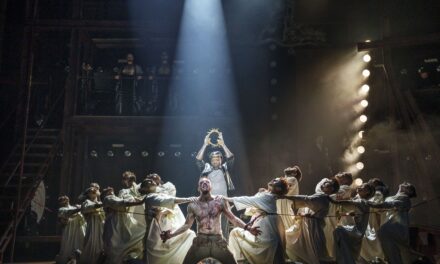It has stood the test of time. Inspired by the success of Holbeck-born Ivy Benson’s all-female swing ensemble, whose fame was at its height during World War Two, Alan Plater‘s often-revived play, based on his television film The Last Of The Blonde Bombshells, uses arrangements familiar to the audience to build to an encore that gives them all the excuse they need to get to their feet, dancing – if not exactly in the aisles – with self-conscious abandon in front of their allocated seats.
Framed by the near-present-day reminiscences of Elizabeth, and the song that her grandmother sang to her as a lullaby, Blonde Bombshells follows the last-ditch efforts of bandleader Betty, portrayed with no-nonsense warmth by Georgina Field, to assemble a full octet in the face of recent desertions from among her ranks to the masculine allure of UK-billeted American GIs. Time and the Luftwaffe are against her since they have bombing raids to shelter from, and a radio engagement that very same night.
Our transition to the morning of the audition is eased by the melody of Elizabeth’s one-time cradle song, If I Had A Ribbon Bow, popularised at the time by Maxine Sullivan. Its melancholy strain ties her not only to secondhand memories of her grandmother’s youth, but sweeps her up in its yearning with all the force of the tornado that takes Dorothy to Oz. Lauren Chinery’s performance, imbued with possibility and loss, prepares the audience to follow her into her grandmother’s footsteps when she literally steps into her school shoes as the young Liz.

Image by Pamela Raith Photography
The auditionees, perhaps because each is allowed a spot by which to introduce themselves, are more clearly differentiated than the existing Blonde Bombshells, for all the jocular familiarity of their workplace banter. Standing out alongside Chinery’s diffident sixth former, still young enough to think the best of strangers, are Gleanne Purcell-Brown’s unworldly nun, blissfully unaware of the double entendres of the George Formby song she performs, and Stacey Ghent’s Miranda, more worldly-wise than both, with the confidence to come up smelling of roses no matter how often she crashes her commanding officer’s car.
A less comfortable fit is Patrick, played by Rory Gradon; not for the more obvious differences in his biology, but for the way his presence can only chafe against the play’s consensus, which, if not cosy exactly, favours the archetype of a small island pluckiness in the face of adversity. Patrick, in his evasion of the draft, cuts a more ambiguous figure, his motives censured as cowardice by Lily and Vera, his eventual submission to pressure to enlist striking a rare discordant note. A different play might have made more of this, but being, in many respects, a jukebox musical of the war years, Blonde Bombshells is less interested in exploring contradiction and more concerned with motoring towards the next big band number.
In this respect, the versatility of the cast’s musicianship, fostered by musical director Greg Last and worn with nonchalance, is almost vertiginous. Performed in Bolton Octagon’s round, their prowess is enough to make one’s head spin, and certainly to underscore the fact that Sarah Groarke, who plays Vera, is herself the musical director of Rainford Brass Band. Under Zoe Waterman’s assured direction, and to paraphrase from one of its hits, it ain’t what you do, it’s the way that you do it, and, with performances as inviting as the cast’s, Blonde Bombshells Of 1943 gains crowd-pleasing results.
All images by Pamela Raith



Blonde Bombshells of 1943 is at the Octagon Theatre, Bolton until July 1, 2023. For more information, click here.








